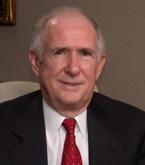
R. Randall Rollins
Based on the feedback I get from readers, divorces are among the most difficult of legal battles to experience. That must be especially true when the opposing party, and his allies, engage in criminal behavior. An Alabama woman apparently was up against that kind of conduct when she tried to divorce a member of an affluent American family, the folks behind Orkin Pest Control.
By their nature, divorces are fraught with emotion and stress, filled with battles over money, property, and child custody. But most divorces, even the ugliest ones, probably stay in the civil arena. That, however, was not the case when Birmingham resident Sherry Carroll Rollins tried to divorce Ted Rollins, who now is CEO of Charlotte-based Campus Crest Communities.
Ted Rollins and the wealthy gentlemen at the top of the Rollins Inc. empire apparently were so determined to make Sherry Rollins pay that they engaged in criminal behavior. And our research indicates they violated at least two Alabama statutes. Given that the divorce case covered ground in three states--South Carolina, Alabama, and Georgia--federal law might also have been trampled.
Who was Ted Rollins' partner in crime? Well, he probably had several, but No. 1 on the list appears to be R. Randall Rollins, the chief executive of Atlanta-based Rollins Inc., the umbrella company for Orkin and other highly profitable enterprises.
We've already shown that Ted Rollins almost certainly committed perjury when he filed a child-support affidavit, called a Form CS-41 in Alabama, claiming he made roughly $50,000 a year--all of it from a mortgage company in Brentwood, Tennessee. This document, signed under oath, came from a guy who owns multiple private jet craft and had ownership stakes in at least two companies--St. James Capital and Campus Crest Communities--at the time.
We also have shown that Randall Rollins also probably committed perjury in the Rollins v. Rollins divorce case when he produced a document claiming that Ted Rollins had sold his share in St. James Capital for roughly $85,000. Based on our review of other documents in the case, plus interviews with Sherry Rollins, we've estimated that St. James Capital had assets totaling at least $243.6 million. We know it had an interest in an RV Park overlooking the Pacific Ocean near San Francisco that was appraised at $7.8 million. We know it had an interest in a major office/industrial development in Greenville, South Carolina, that was appraised at $9.6 million.

Ted Rollins
Testimony at the divorce trial showed that St. James Capital had 28 properties throughout the United States and Canada. But we are to believe that Ted Rollins would sell his share in a $243-million company for $85,000? I don't think so.The Rollinses' statements under oath appear to violate Code of Alabama 13A-10-101 (Perjury in the first degree). And that is a Class C felony, the kind of conduct that can send a person to prison, with an orange jumpsuit in tow, for one to 10 years. Here is how that code section reads:
Section 13A-10-101
Perjury in the first degree.
(a) A person commits the crime of perjury in the first degree when in any official proceeding he swears falsely and his false statement is material to the proceeding in which it is made.
(b) Perjury in the first degree is a Class C felony.
(Acts 1977, No. 607, p. 812, §4905.)
The apparent crimes in Rollins v. Rollins do not stop there. Alabama law takes a particularly dim view of folks who lie about financial matters. That's why we have Code of Alabama 13A-9-49 (Issuing False Financial Statement). Here is how the code section reads:
Section 13A-9-49
Issuing false financial statement.
(a) A person commits the crime of issuing a false financial statement if, with intent to defraud, he:
(1) Knowingly makes or utters a written instrument which purports to describe the financial condition or ability of himself or some other person and which is inaccurate in some material respect; or
(2) Represents in writing that a written instrument purporting to describe a person's financial condition or ability to pay is accurate with respect to that person's current financial condition or ability to pay, knowing or having reason to believe the instrument to be materially inaccurate in that respect.
(b) Issuing a false financial statement is a Class B misdemeanor.
(Acts 1977, No. 607, p. 812, §4145; Acts 1979, No. 79-664, p. 1163, §1.)
A Class B misdemeanor can land you in a county jail for up to six months.
Did Ted and Randall Rollins "utter written instruments which purported to describe the financial condition or ability of himself or some other person and which is inaccurate in some material respect"? The record strongly suggests the answer is yes. And that takes the wrongdoing in Rollins v. Rollins to a whole new level.
The civil wrongs, by definition, were against Sherry Rollins--and by extension, her daughters, who were cheated out of child support to which they were entitled under the law. That's bad enough, but the wrong on the civil side is contained to a few people.
Crimes, on the other hand, are considered a wrong against society. Ted and Randall Rollins probably thought they were just cheating Sherry Rollins, but that's not how our system of justice views things. A crime, by definition, is a wrong against the norms of society; it harms all of us.
Ted and Randall Rollins should be held accountable in a court of law. But they should not have to answer just to Sherry Rollins; they should answer to all of us.
